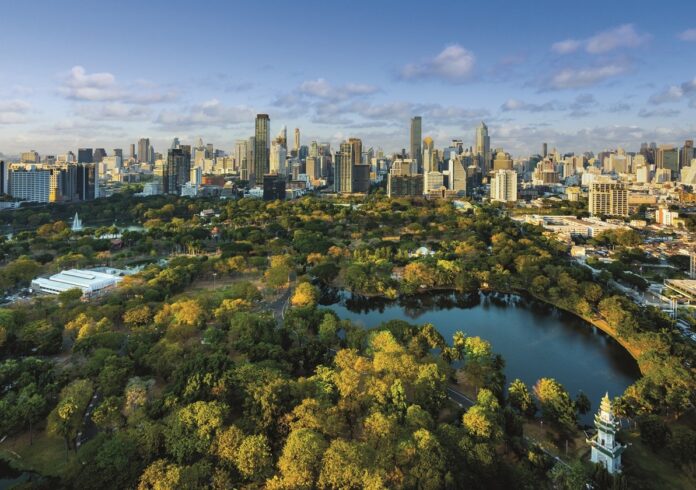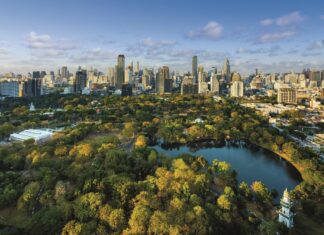The 2025 IWA Water and Development Congress & Exhibition is approaching fast and will help advance options for low- and middle-income countries. Erika Yarrow-Soden previews the event.
With huge investments being directed towards water and sanitation infrastructure, particularly in the Global South, IWA’s Water and Development Congress & Exhibition (WDCE) 2025 will once again deliver a comprehensive programme focused on the water-related needs of low- and middle-income countries.
To be held in Queen Sirikit National Convention Center, Bangkok, Thailand, on 8-12 December 2025, this edition will build on the success of the 2023 edition held in Kigali, Rwanda, providing the vital opportunity to share knowledge on innovations in science and practice, and highlight the opportunities for securing new and effective solutions in water and sanitation policy, technology and management.
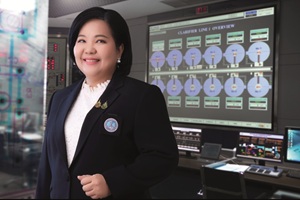
Reflecting on the challenges of the region, the Governor of Thailand’s Metropolitan Waterworks Authority (MWA), one of WDCE’s partner organisations, Suwara Thawitchasri said: “One of the most critical challenges we face is the security and quality of raw water sources. Climate change is creating increasingly unpredictable conditions – droughts, floods, and saltwater intrusion – that directly affect both the availability and quality of water for production.
“Another key issue is the growing demand for water driven by rapid urbanisation. As Bangkok continues to expand, we must consistently upgrade and expand our supply networks to ensure safe and reliable access to clean water for every community. These issues are vital because they directly impact public health, the resilience of the city, and the overall economic development of Thailand.”
Advancing innovation
With an overarching theme of ‘Water, sanitation, and innovation – pathways to progress and a resilient future’, this year’s WDCE will present solutions spanning water and sanitation services, the role of water in urban areas, the links between cities and basins, and the opportunities to achieve climate resilience. Featuring keynote addresses by leading figures in the sector, specially invited to share their experiences in shaping and delivering solutions, the programme will also provide a unique platform for water professionals to present and share their recent findings and insights.
High Level Summit
A landmark feature of WDCE 2025 will be the High Level Summit on ‘Water Security and Resilience’ to be held on 9 December. Convened in collaboration with the Asian Institute of Technology (AIT), the Asian Development Bank (ADB), and other strategic partners, this prestigious event aims to bring together the political and decision-making aspects of water and sanitation, complementing the technical and professional dialogues with strategic leadership perspectives, creating an unparalleled opportunity to align regional and global priorities on water security.
This invitation-only event will gather high-level leaders from governments, international organisations, and key institutions across South and Southeast Asia, ensuring a trusted space for regional voices to come together. The discussions will culminate in the release of the Bangkok Communiqué on Water Security and Resilience, a forward-looking statement reflecting shared priorities and actionable pathways toward a more secure and resilient water future.
Asari Daud, IWA Vice President, said: “The pressures on our water systems are intensifying, and the urgency of advancing water security and resilience has never been greater. In South and Southeast Asia, where rapid growth meets climate stress, the challenges are profound but so too are the opportunities. This summit provides a vital platform to unite regional leaders, breaking down silos, and building new models of cooperation. By aligning political will with technical expertise, and fostering South-South collaboration, we can accelerate progress toward the Sustainable Development Goals and shape a shared, resilient water future. The Bangkok Communiqué will stand as a statement of our common priorities and a roadmap for collective action.”
Utility and Regulation Forums
‘Driving innovation, shaping inclusive and sustainable water futures’ is the theme of the Utility Leaders Forum, which will be held on 10 December. Presenting a unique opportunity for those tasked with managing utilities to exchange views, network and access the insights of prominent water utility leaders in a setting that is by utility leaders for utility leaders, the Utility Leaders Forum is curated by an international committee of experienced utility practitioners and is structured to facilitate an open and interactive dialogue around some of the most critical issues facing utilities.
William Fernandes, deputy general manager, City of Toronto, and IWA Board member said: “In IWA we aim to be a global home for utilities, engaging them in enriching exchanges. We see utilities standing at the intersection of innovation and responsibility. This iteration of the Utility Leaders Forum is a unique opportunity to share global perspectives and learn from each other’s successes and failures in innovation. We hope that this forum will bring about meaningful change, ensuring water services are inclusive, sustainable and resilient for all communities.”
Also taking place on 10 December is the International Water Regulators Forum, this year marking its 10th anniversary and offering a unique opportunity to explore regulatory innovation, regional cooperation and inclusive governance.
Emerging Water Leaders Forum
The 2025 Emerging Water Leaders Forum, which will be held on 11 December, will focus on equipping the next generation to lead in the face of climate, governance, and capacity challenges, ensuring water systems are resilient, equitable, and future-ready. Strongly aligned with the resilience focus of this edition of WDCE, the forum will have an emphasis on personal and institutional growth, showcasing future-ready skills, inclusive leadership and big picture strategic thinking.
Chotiwat Jantarakasem, Chair of Thailand’s Young Water Professionals Chapter, said: “Every day, Young Water Professionals are driving change across the global water sector. This year, I’m thrilled to welcome young people to my home country. The IWA Emerging Water Leaders Forum will not only recognise the vital role of youth in the water sector, but also inspire us to imagine what we can achieve together for a better water future.”
Inclusive Urban Sanitation Forum
Also taking place on 11 December, the Inclusive Urban Sanitation (IUS) Forum will provide a platform to share lessons from three years of engagement in advancing the Citywide Inclusive Sanitation (CWIS) approach, highlighting key findings from the recently completed CWIS Global Consultation, which gathered insights from more than 50 organisations worldwide. It will also serve as an opportunity for sector stakeholders to reflect on progress toward the Sustainable Development Goals in relation to sanitation and explore priorities beyond 2030.
Priscillah Oluoch, head of sanitation and programmes at the Malindi Water and Sewerage Company, Kenya, and a member of the IUS Task Force said: “Inclusive urban sanitation is about more than infrastructure, it is about people, power and possibility. Progress happens when every voice counts, when communities help shape solutions and when institutions break silos to work together. Citywide Inclusive Sanitation shows us that resilience grows when sewered and non-sewered systems coexist, when innovation is guided by equity, and when dignity and health are at the centre of design. In a changing climate and with fast-growing cities, the most powerful innovation is inclusion, because only by serving everyone, everywhere, can sanitation become the true foundation of sustainable and resilient futures.”
From Land to Sea
A further forum to be held on 11 December is ‘From Land to Sea: Tackling Pollutants, Protecting Health, and Restoring Ecosystems’. This forum will explore the sources of pollutants from land and sea, their impacts on human health and marine ecosystems, and identify practical solutions to reduce these threats and promote healthier, more resilient environments.
Advancing solutions for the region and beyond

“Climate change, urbanisation, and population growth are intensifying water challenges across Asia,” said Prof Sangam Shrestha, co-director of the Global Water & Sanitation Center at the Asian Institute of Technology, Thailand. “We believe integrated solutions – digital innovations, nature-based approaches, and inclusive governance – are critical for resilience and equitable access. The IWA Water and Development Congress & Exhibition 2025 is a vital platform to exchange knowledge, showcase regional leadership, and build global partnerships that advance water security and accelerate progress towards SDG 6.”
Local relevance is highlighted by Wilas Chaloeysat, Governor of Thailand’s Metropolitan
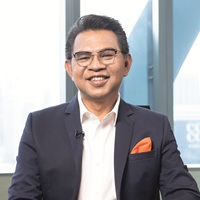
Electricity Authority (MEA), a partner organisation of WDCE, who said: “For the Metropolitan Electricity Authority, efficient water management is a priority issue directly linked to both society and the environment. We place strong emphasis on responsible water use, minimising the impacts of wastewater and ensuring long-term water security. For MEA, comprehensive management is not only about meeting operational needs, but also about aligning with environmental standards and our commitment to social responsibility.”
Looking internationally, Dr Jennifer Balatedi Molwantwa, CEO of the Water Research

Commission (WRC), South Africa, a strategic partner of the WDCE, said: “Research, development, and innovation extend beyond local challenges. The WRC values collaboration at regional, continental, and global levels to exchange insights, share lessons and co-create scalable solutions for the water and sanitation sector. As a strategic partner, WRC is pleased to see sanitation featuring prominently on the development conference agenda. Addressing water and sanitation challenges remains central to achieving inclusive and sustainable development. The WRC looks forward to a successful Development Conference and the meaningful exchanges it will foster.”
With inspiring keynotes, forums, social activities and an extensive exhibition, this edition of IWA’s Water and Development Congress & Exhibition is set to deliver a world-class event dedicated to delivery of sustainable water and sanitation to those in pressing need.
As Prof Pai-Chi Li, President of co-organiser AIT, concluded: “We are proud that AIT is co-hosting the International Water Association’s Water and Development Congress, which reflects our role as a hub for innovation, dialogue and collaboration in Asia. Our vision is to build a sustainable and inclusive future, and this gathering presents an opportunity to connect global expertise with local action, transforming ideas into tangible solutions that enhance water and sanitation for communities across Southeast Asia and beyond.”
More information
www.waterdevelopmentcongress.org
ADB and water – a strategic imperative for Asia and the Pacific
Norio Saito, Senior Director, Water and Urban Development Sector Office, ADB
Asia and the Pacific are facing a convergence of threats: growing demand, resource scarcity, climate extremes, and growing inequality. In this context, water security isn’t just a development goal, it’s a strategic imperative for resilient, sustainable, and inclusive growth.
The Asian Development Bank’s (ADB) forthcoming publication, Asian Water Development Outlook (AWDO) 2025, will show that Asia-Pacific is making strides in water security. However, the stakes are rising. Our data finds that over the past 12 years, a significant number of people have moved out of extreme water insecurity, thanks to countries prioritising their weakest areas, mainly in rural water supply and sanitation services. Yet, despite having basic access to water supply and sanitation, many remain vulnerable to poor water quality, unsafe sanitation, ecosystem degradation and climate shocks.
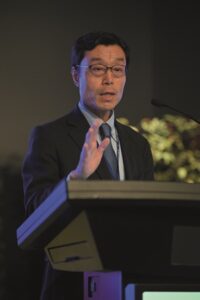
In addition, climate-related disasters are accelerating, outpacing readiness and reversing hard won development gains. Moreover, environmental water security has emerged as the region’s most urgent challenge, with ecosystems under siege from unchecked development and underinvestment in conservation efforts.
AWDO 2025 will make it clear that infrastructure alone is not enough. Without sustainable service delivery, maintenance, and healthy ecosystems, water systems cannot deliver lasting health or resilience. The path forward demands bold, integrated action where climate adaptation, ecosystem protection, and inclusive planning are no longer optional, but essential.
In response, ADB is scaling up efforts for water security through financing, technical assistance, knowledge, and partnerships. Non-revenue water reduction is critical to reduce wastage and improve service delivery inclusively and efficiently. We are helping our client countries strengthen water sector policies, institutions, and regulations to enhance sustainability and attract the private sector. City-Wide Inclusive Sanitation (CWIS) is being mainstreamed to provide safely managed sanitation services inclusively. In addition, the Glaciers to Farms initiative – aimed at mobilising up to $3.5 billion from ADB and the Green Climate Fund – has been launched for glacier preservation and to enhance the resilience of communities, food systems, and social infrastructure in nine countries in Central and West Asia. We are also strengthening multilateral cooperation and governance to address systemic challenges.
As Principal Strategic Partners we hope that IWA’s Water and Development Congress & Exhibition 2025 (WDCE) will provide a vital platform for dialogue and innovation, enabling ADB to strengthen partnerships with governments, financiers, the private sector, academia, and other relevant organisations.
AWDO 2025 will be officially launched at the WDCE opening plenary session on 8 December. We look forward to meeting you at the event to exchange ideas and forge partnerships to build a water-secure and climate-resilient future.


